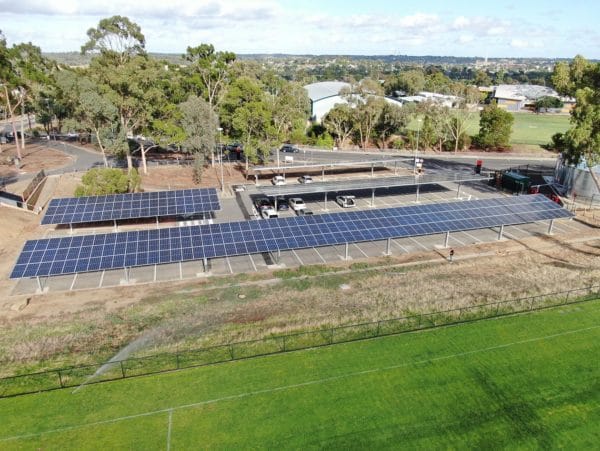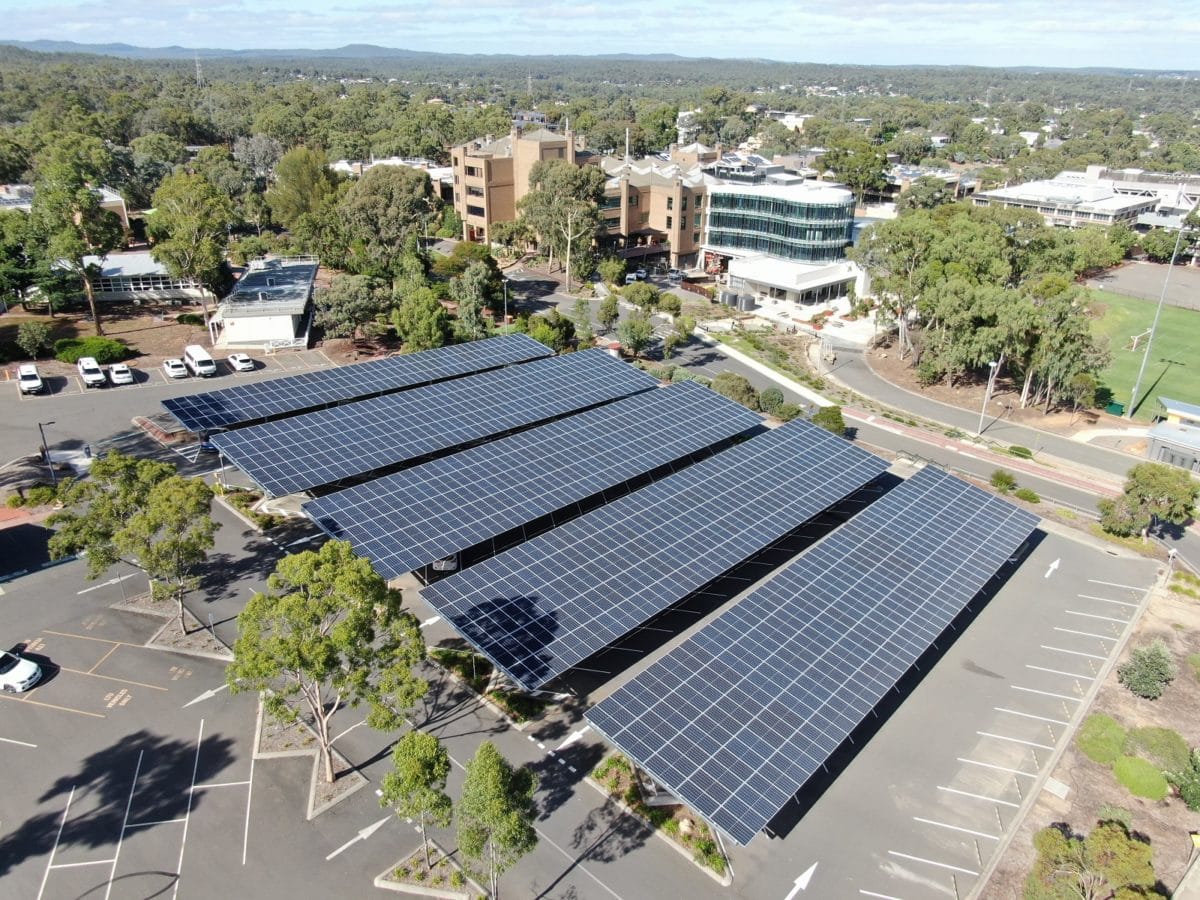Solar-shaded car parking and an extra dusting of rooftop solar across the buildings of La Trobe University in Bendigo have added 800 kW to the campus’s solar generation. Thirty per cent of campus energy needs are now supplied by onsite solar as the University hurtles towards its goal of net zero emissions from its regional campuses by 2022 and university-wide net-zero emissions by 2029.
“It’s exciting to see these carports and other initiatives come to fruition after years of planning,” said La Trobe Vice-Chancellor, Professor John Dewar, of the University’s rollout, not only of solar, but also of 24,000 energy efficient LED lights across all campuses which have reduced the University’s electricity consumption for lighting by more than 50%.
Dewar and La Trobe Chancellor John Brumby officially launched the university’s $75 million net-zero initiative in 2019, with ambitious plans to transition the university’s Melbourne, Bendigo, Shepparton and Albury-Wodonga campuses, along with other properties to run on renewable generation within 10 years.
By July 2020, it had decked the hall rooftops of its north Melbourne Bundoora campus with more than 7,500 solar panels, or 2.5 MW of generation, capable of powering up to 50% of the campus’s daytime power usage when the sun and panels are working in tandem to produce at their peak.
At the time, Dewar estimated that the university would save up to $615,000 a year thanks to its switch to solar.
In January this year, La Trobe scored a triumphant win with the completion of its solar-powered sports stadium, part of Stage 2 of its Sports Park development.
The 519 kW rooftop stadium array can generate 724,000 kWh of solar energy each year, or more than enough to power the indoor stadium with its six multi-purpose highball courts, a teaching and research building and office space for commercial tenants. Daytime surplus from the facility is channeled to supplement the needs of the main campus.
The University last year also placed fourth in the world for its contribution to the United Nation’s Sustainable Development Goals, according to the Times Higher Education Impact Rankings.
President of the Bendigo Sustainability Group, Colin Lambie, last week praised the drive of La Trobe University to achieve its goals, hailing it as a model for other organisations that are serious about minimising their emissions.
“Reducing carbon emissions and impact on the environment should be a significant focus for all organisations,” Lambie said.
Bendigo campus now has more than 3,300 solar panels installed; harvests around two million litres of rainwater each year, which it uses for irrigation and to flush toilets; and feeds a large-scale composter which turns around 100 kg of organic waste into 20 kg of nutrient-rich fertiliser for use on campus grounds every day.

Image: La Trobe University
Dewar said of last week’s solar carport completion, “Not only do students and staff now have a shady place to park their cars during hot days, but with this investment we have significantly reduced the campus’ running costs and carbon emissions.”
The completion of La Trobe’s Regional Solar Carports and Rooftops project, which included 270 panels (110 kW) installed over parking at Albury Wodonga campus, helps to reduce the University’s emissions from regional campuses by more than 20%.
This content is protected by copyright and may not be reused. If you want to cooperate with us and would like to reuse some of our content, please contact: editors@pv-magazine.com.









2 comments
By submitting this form you agree to pv magazine using your data for the purposes of publishing your comment.
Your personal data will only be disclosed or otherwise transmitted to third parties for the purposes of spam filtering or if this is necessary for technical maintenance of the website. Any other transfer to third parties will not take place unless this is justified on the basis of applicable data protection regulations or if pv magazine is legally obliged to do so.
You may revoke this consent at any time with effect for the future, in which case your personal data will be deleted immediately. Otherwise, your data will be deleted if pv magazine has processed your request or the purpose of data storage is fulfilled.
Further information on data privacy can be found in our Data Protection Policy.